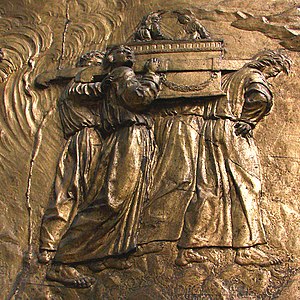 Image via Wikipedia
Image via WikipediaA new leader and a new generation stood apprehensively and excitedly along the Jordan River waiting for Joshua to set the date. After three days of waiting, the tribal leaders were told to instruct the people to sanctify themselves, because the next day the Lord was going to do amazing things in their midst. In Hebrew קָדַשׁ (qadash), sanctify, means to set yourself apart (from sin), to be consecrated, to be dedicated, hallowed. Maybe, sanctifying themselves in this context meant to seek forgiveness for all sin, intentional or not. They were to prepare their hearts to see the Lord working in their midst. For nearly forty years, they heard stories or accounts of the miraculous exodus from Egypt. Even though God provided Israel with water, manna, direction, successful battles, these became commonplace expectations. God’s mercies were the same every morning and every night. Israel was looking forward to witnessing a big miracle; a new miracle; something different.
While the people of Israel watched with great excitement and anticipation, the priests did what Joshua told them to do. Carrying the Ark of the Covenant, the priests stepped into the raging flood level waters of the Jordan River and suddenly, the river stopped flowing. According to Joshua, the waters piled up in Adam, a town fifteen miles north of the Israelite camp. As they crossed the Jordan on dry ground, all of Israel and their herds passed the priests holding the Ark. While the priests were still standing in the middle of the river bed, twelve men, representative of each of the twelve tribes, took a boulder from the river and carried it into the land of Canaan, to Gilgal, where they set up memorial to commemorate how God parted the Jordan River. This was a new monument for a new generation. This was a big miracle.
Israel, which sanctified itself before the crossing, now sought to right itself completely before God. Because boys were not circumcised during the desert wandering, all Israelite men agreed to be circumcised after they crossed the Jordan. This appears to be a resounding statement of trust in God’s protection. Just before a major battle and right after entering hostile territory, all Israelite men were weak from the pain of circumcision and therefore very vulnerable to enemy attack. Even so, the nation’s males had to be circumcised because that was the sign of the everlasting covenant that God established with Israel (Gen 17: 7 -14). How could they face any war in a hostile land if they did not have the sign of the covenant? While the nation chose to honor their side of the everlasting covenant, God protected them while they healed.
After all of Israel’s men submitted to the sign of the covenant in their flesh, circumcision, they were ready to heed God’s command about taking down the citadel called Jericho. God told Joshua that He already went ahead of them generating fear among denizens; the spies told Joshua that the people of Jericho were terrified of them. It may be that this extra information corroborated what God had said earlier. At any rate, Jericho’s morale was severely deflated. Conversely, Israel was now confident in God.
This is a fascinating, choreographed battle. Through Joshua, God communicated with the people of Israel. God told them of His plan and how to implement it. An armed guard was to go before the Ark and after the Ark, while the priests carrying the Ark were to be accompanied by seven priests who sounded seven trumpets. As the armed men marched silently around the city once each day for six days, only the trumpets could be heard. On the seventh day, the men marched around the city six times silently as they had before. However, during the seventh circuit, the trumpets signaled a special blast, at which time the men knew to shout, for the Lord had given them this city. At this historic shout, all of the walls of Jericho crumbled and fell. As per God’s command, Israel destroyed the city saving only Rahab and all of her family. A scarlet cord was tied around her window to alert Israel that she was to be protected, not harmed. I wonder if the Cabbala tradition of a red bracelet or red something stems from this incident.
God fought and won this battle for Israel thus setting into motion a great fear of Israel among the denizens. I have no doubt that all of the nations understood that this was a supernatural battle fought by an omnipotent God. And, by God’s Word, Israel was different from all of the others nations.
Blue Letter Bible. "Dictionary and Word Search for 'sanctify' in the KJV". Blue Letter Bible. 1996-2010. 8 Oct 2010. < http:// www.blueletterbible.org/search/translationResults.cfm?
Criteria=sanctify&t=KJV >
Criteria=sanctify&t=KJV >

No comments:
Post a Comment